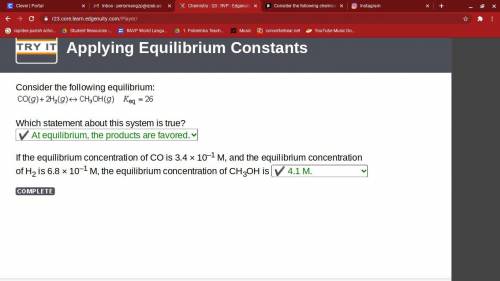
Consider the following chemical reaction: co (g) + 2h2(g) ↔ ch3oh(g) at equilibrium in a particular experiment, the concentrations of co and h2 were 0.15 m and0.36 m, respectively. what is the equilibrium concentration of ch3oh? the value of keq for this reaction is 14.5 at the temperature of the experiment. what is the equilibrium concentration of ch3oh?
a) 14.5b) 7.61 x 10 ^ -3c) 2.82 x 10 ^ -1d) 3.72 x 10 ^ -3e) 1.34 x 10 ^ -3

Answers: 3


Another question on Chemistry

Chemistry, 22.06.2019 11:00
Which are examples of how technology has advanced scientific understanding.1using hot water to sterilize medical equipment.2transplanting a human organ into another individual.3inserting genes from one sheep into another cell to make a cloneunderstanding the different structures that make up a cell.4examining microorganisms from the deepest parts of the ocean
Answers: 2

Chemistry, 22.06.2019 15:20
Which description best characterizes the motion of particles in a solid?
Answers: 2


Chemistry, 22.06.2019 19:00
Imagine that a new planet is discovered with two moons of equal mass: moon a and moon b. the mass of the new planet is greater than the combined mass of its moons. moon a is farther away from the new planet than moon b. what is the planet's gravitational pull on moon a compared to the planet's gravitational pull on moon b? the planet's gravity repels moon a with a greater force than it repels moon b, which is why moon a is farther away. the gravitational pull on moon b is greater than on moon a because moon b is closer to the new planet than moon a. the gravitational pull on moon b is greater than on moon a because moon b is farther away from the new planet than moon a. the gravitational pull on moon a is the same as the gravitational pull on moon b because distance does not affect the planet's gravity.
Answers: 1
You know the right answer?
Consider the following chemical reaction: co (g) + 2h2(g) ↔ ch3oh(g) at equilibrium in a particular...
Questions

Mathematics, 22.10.2019 01:50

History, 22.10.2019 01:50



English, 22.10.2019 01:50

Social Studies, 22.10.2019 01:50

Arts, 22.10.2019 01:50

Mathematics, 22.10.2019 01:50


Mathematics, 22.10.2019 01:50

Mathematics, 22.10.2019 01:50

History, 22.10.2019 01:50

Chemistry, 22.10.2019 01:50


Mathematics, 22.10.2019 01:50

English, 22.10.2019 01:50

Mathematics, 22.10.2019 01:50



Law, 22.10.2019 01:50


 will be, (C)
will be, (C) 
 at equilibrium = 0.15 M
at equilibrium = 0.15 M at equilibrium = 0.36 M
at equilibrium = 0.36 M
![K_c=\frac{[CH_3OH]}{[CO][H_2]^2}](/tpl/images/0155/4298/4cf94.png)
![14.5=\frac{[CH_3OH]}{(0.15)\times (0.36)^2}](/tpl/images/0155/4298/2d443.png)
![[CH_3OH]=2.82\times 10^{-1}M](/tpl/images/0155/4298/5b3a4.png)


